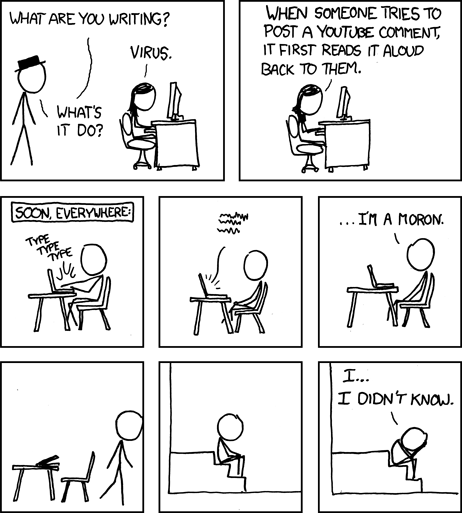1. Please dear god make this an imperative:
2. Why don't apes use language although they could? Because they don't have a psychological infrastructure of shared intentionality. Bolles' Review of Tomasello's Power Point Prose: Part 1 & Part 2
3. I always wondered which type of camouflage the US Army use since it looks like bad pixels of ancient computer days. Here's why they use digital camouflage: Can You See Me Now?
4. Dying of capsaicin? Well, I eat Habaneros every day - no joke: Which organisms can feel pain? & Chili, capsaicin and cancer
5. Time for linguistic lolcat:
6. After several years of detective work, philologists at the University of Stavanger in Norway have collected a unique collection of texts online. Now they're about to start the most comprehensive analysis of middle English ever: New life for Middle English: Norwegian detective work gives new knowledge of the English language.
7. Syntactic persistence is the tendency for speakers to produce sentences using similar grammatical patterns and rules of language as those they have used before. Although the way this occurs is not well understood, previous research has indicated that this effect may involve a specific aspect of memory function. Memory is made up of two components: declarative and procedural. Declarative memory is used in remembering events and facts. Procedural memory helps us to remember how to perform tasks, such as playing the piano or riding a bike. A recent study suggests that the common phrase, "it's so easy, it's like riding a bike" should perhaps be replaced with "it's so easy, it's like forming a sentence.": Un-total recall: Amnesics remember grammar, but not meaning of new sentences
9. Cool new robots from Japan with cool abilities: Photos: Robots at CEATEC 2008
10. It's the thalamus that actually matters for sentence processing: Thalamus? Yes. Basal ganglia? Nope.
11. Beautiful statue: "Transi de René de Chalon," Ligier Richier, 1547
12. Broca's area shows a "sentence complexity" effect. It responds more during the comprehension of object relative (OR) constructions than easier to process subject relative (SR) constructions: Broca's area, sentence comprehension, and working memory
13. Carbon nanotechnology in an 17th century Damascus sword
14. A Bob Dylon song encoded in XML: Encoding Dylan
15. Why choose the lesser evil?
16. Interesting, really: How to beat of a cold
17. Taking the new out of neurons
18. Robo-starfish learns about itself and adapts to injuries
19: 2008 IgNobels
Sunday, 5 October 2008
Subscribe to:
Post Comments (Atom)





No comments:
Post a Comment